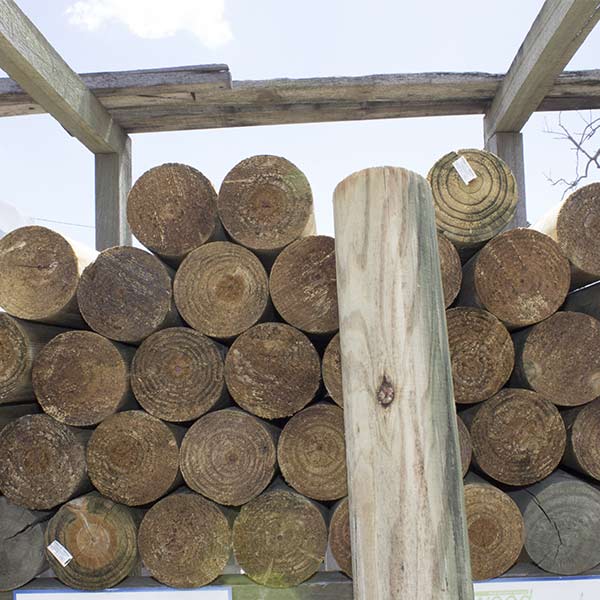It is a mix of chromium , copper and arsenic (as Copper(II) arsenate ) formulated as oxides or salts, and is recognizable for the greenish tint it imparts to timber. The copper in the wood serves as the fungicide whereas the arsenic protects the wood against insects. The chromium fixes the copper and arsenic to the wood. However, a considerable amount of ACQ lumber is being use including posts and dimension lumber (2× 2× etc). Hoover follows up the treating process with an optional kiln drying process to gently remove the moisture added during treatment.

We sell wood and pressure treated lumber products to your specifications and in accordance with national and local regulations. Most dimensional pressure treated lumber is treated to. Larger dimensional lumber (2×and above) can be treated to.
Cca treated wood chemicals were found to dissolve in water and leach out of the wood , causing potential harm. Sealing cca treated lumber will reduce leaching of the chemicals. In addition, the treated product is clean, dry, non-slippery, and paintable, low in odor, and has a pleasing appearance. Swallowing arsenic is known to cause cancer in humans. Retention level measures how much of the preservative is retained in the wood after the pressure treatment ends.
The formulation renders wood useless as a food substance for termites and fungi while keeping the wood attractive, clean, odorless, and non-staining. It is the treater’s responsibility to comply with the terms of the label. Chromated Copper Arsenate is used in a wide variety of wood products such as: Poles, posts, piles, timbers and plywood.
However, the preservation retention is different for another common treatment, called CA-B. The CA-B treatment level of. The wood dried with a green tint because of the copper, but otherwise it was similar to ordinary lumber , except that it stood up to even the dampest, warmest climates. It is clean to work with, long-lasting, and relatively non-corrosive to metal hardware and fasteners. Overview of Wood Preservative Chemicals.

This was a voluntary agreement with the United States Environmental Protection Agency. The treatment process typically used on poles and skirt boards of your Hansen Building kit is commonly MCA with a some locations using CA treated lumber. Azole (MCA) or Copper Azole (CA). Find submittal-ready datasheets, SDS, specs, ICC-ES reports.
Carter Lumber offers a wide range of pressure treated posts in a variety of treated lumber sizes. For an instant free quote, click here! CCA fence posts available.
Bundles of lumber are placed on tramcars, which roll into the cylinder. Lumber must have moisture content of or below in order to be treated. Initial Vacuum – air is taken out of the lumber. The amount of time in the initial vacuum is determined by the species and its.
Southern Pine Lumber Company has over 5Marine Piling in stock. We have sizes available from a 5” top to an 18” butt and lengths to 65’. All our marine pilings are generally graded in accordance with ASTM Dand are treated to 2. Bill: I am the publisher of the website BANCCA. This is typically done to protect the lumber from insects and extend its longevity. The agreement reached called for the phase-out to take place over the following two years.
This is a partial list of the treated lumber available, if you do not see what you need contact us at the following:. Coastal Wood Industries stocks pressure treated southern yellow pine timbers for in-ground and marine use. Treated timbers can be used for a variety of marine projects. Pressure treatment ensures the woods resistance to rot and decay.
C-to add a new subdivision (33), and amended G. Health-Related Litigation. This process is called fixation, and is defined by the AWPA in standard Aunder T1-Section G. Many pressure-treated lumber. The chemical used to preserve Wolmanized Heavy Duty pressure treated wood is a mixture of the oxides of copper, chromium, and arsenate known as CCA. Apache Forest Products supplies treated and untreated wood poles and pilings for projects across the nation.
It contains chromium, copper, and arsenic. It was developed by an Indian scientist names Dr. When wood treated with this preservative is burne some of the arsenic is released into the air with the fly ash, and the rest is concentrated in the ash that remains in the fireplace.
No comments:
Post a Comment
Note: Only a member of this blog may post a comment.